한상혁 기자
입력 : 2017.07.03 15:33
버락 오바마 전 미국 대통령은 3일 서울 워커힐호텔에서 열린 ‘제8회 아시안리더십컨퍼런스’ 기조연설 후 가진 ‘리더와의 대화’ 섹션에서 함재봉 아산정책연구원장으로부터 사드 관련 질문을 받고 이렇게 답했다.
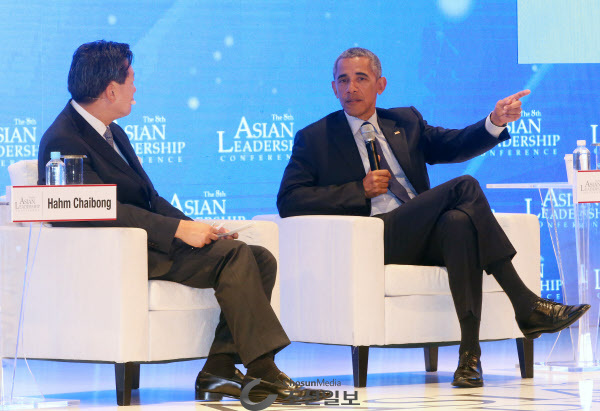
오바마 전 대통령은 북한의 연이은 도발에 대한 대응 수단으로 “북한은 글로벌 경제에서 완전히 고립된 상태이기 때문에 이란과 달리 압박에 한계가 있다”며 “유일하게 의존하는 것이 중국이기 때문에 중국이 북한에 압박을 가하도록 압력을 가해야 한다”고 말했다.
함 원장이 “이런 측면에서 미·중 간의 경쟁 관계가 한국에 있어서는 상황을 복잡하게 만드는 요소”라고 지적하자 오바마 전 대통령은 “중국이 본질적으로 북한을 대할 때 조심스러워하는 것 같다”고 답했다.
오바마 전 대통령은 이어 “하지만 미국과 중국의 전략적인 이해는 본질적으로 충돌하거나 상충되진 않는다”며 “중국의 평화로운 부상이 우리 모두의 이해와 맞아떨어지며, 오히려 불안정하고 혼란스러운 중국이 우리 위협이다. 이런 메시지를 시진핑 중국 주석에게도 적극적으로 전달했다”고 말했다.
오바마 전 대통령은 한국과 일본의 관계에 대해 “미국과 독일, 독일과 프랑스·영국이 그랬듯이 과거의 비극을 넘어 긴밀한 관계가 될 수 있다”며 “한·미·일의 가장 큰 위협은 바로 북한이고, 북한의 잠재적인 미사일 발사에 대비하려면 전략적인 이해와 긴밀한 군사 협력이 필수”라고 말했다.
오바마 전 대통령은 도널드 트럼프 미국 대통령이 탈퇴를 결정한 파리 기후변화 협약을 탈퇴한 데 대해서도 언급했다. 그는 “미국의 캘리포니아 주의 경우 세계 2대 경제에 맞먹는데 주 정부 차원에서 기후변화 이행하려고 하니 희망을 가질 수 있다”고 말했다.
함 원장은 “마지막으로 가장 어려운 질문”이라면서 “다음 번 커리어는 어떤 것을 선택할 것인가”라고 질문했다.
오바마 전 대통령은 “무엇이 되든 간에 아내 미셸을 계속 행복하게 하는 게 최우선”이라고 답한 후, “그 외 제가 가장 큰 영향을 미칠 수 있는 부분은 차세대 리더 양성이라고 생각한다”고 답했다.
오바마 전 대통령은 “재단을 통해 젊은 인재들을 발굴하고 재원을 제공해 20~30년 후 차세대 지도자들로 키우겠다”며 “똑똑하고 근면한 23~24세 청춘을 만나서 얘기하는 것만큼 보람찬 일이 없다”고 말했다.
출처 : http://news.chosun.com/site/data/html_dir/2017/07/03/2017070301811.html
버락 오바마 전 美대통령, 퇴임 후 첫 방한…
'세상을 바꿀 리더십' ALC 강연
입력 : 2017.07.03 13:44
"좋은 아침" 한국어 인사한 오바마, "미국 젊은이들 '샤이니' 알기 위해 한국어 공부해"
출처 : http://news.chosun.com/site/data/html_dir/2017/07/03/2017070301347.html
입력 : 2017.07.03 12:13 | 수정 : 2017.07.03 15:11
버락 오바마 전 미국 대통령은 3일 오전 조선일보가 주최한 제8회 아시안리더십콘퍼런스(ALC) 기조 연설 첫머리에서 '좋은 아침'이란 한국어로 재임 당시와 변함없는 ‘한국 사랑’을 드러냈다.
오바마 전 대통령은 "미국 대통령으로서 서울을 네 번 방문했다. 미국 바깥의 도시 중 어느 곳보다도 많이 찾은 것"이라며 "이는 한·미 동맹의 굳건함을 증명하고, 또 내가 김치와 불고기를 얼마나 좋아하는지를 보여준다"고 말했다.
오바마 전 대통령은 이어 "오랜 벗인 이명박 전 대통령과 새 대통령인 문재인 대통령과 만나기를 희망한다"며 "저의 오랜 친구이자 동료인 마크 리퍼트(전 주한 미국 대사)가 같이 오게 돼 기쁘다"고도 말했다.
오바마 전 대통령은 또 이날 연설에서 이례적으로 한국의 보이그룹 '샤이니'를 언급했다.
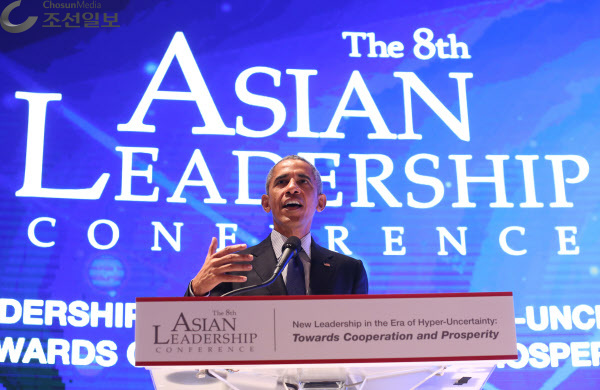
그는 한국의 발전된 모습과 미국과의 우호 관계를 거론하면서 "한국에서 유명한 영화가 제작되고 있고 미국 젊은이들은 '샤이니'를 알기 위해 한국어를 공부한다"며 "마찬가지로 샤이니는 미국의 인앤아웃 햄버거를 좋아한다고 알고 있다"고 말했다.
오바마 전 대통령은 오늘날 한국의 번영이 "자유 시장의 힘과 민주주의 통치, 전 세계와의 연계성이 얼마나 강력한지를 보여준다"면서 "이는 한국인이 창의성과 민주적 절차에 대한 굳건한 의지, 혁신과 놀라운 근로 윤리가 있었기에 가능한 것"이라고 평가했다.
오바마 전 대통령은 또 "서울을 보면 엄청난 기회와 열린 사회로 인한 활발한 문화를 볼 수 있고, 반대로 북한이 겪는 빈곤과 억압, 고통은 폐쇄 사회와 법치의 부재, 전 세계에 대한 적개심의 결과"라고 말했다.
출처 : http://news.chosun.com/site/data/html_dir/2017/07/03/2017070301347.html
오바마 "北, 계속해 세계 질서 거부하면 반드시 그에 걸맞은 결과에 직면할 것"
출처 : http://news.chosun.com/site/data/html_dir/2017/07/03/2017070301113.html
입력 : 2017.07.03 11:14 | 수정 : 2017.07.03 14:27
오바마 전 대통령은 이날 오전 조선일보가 서울 워커힐호텔에서 주최한 제8회 아시안리더십콘퍼런스(ALC) 기조연설에서 “미래는 파괴하려는 이들의 것이 아닌, ‘만들어가는 이들(those who build)’의 것임을 알아야 한다”며 이렇게 말했다.
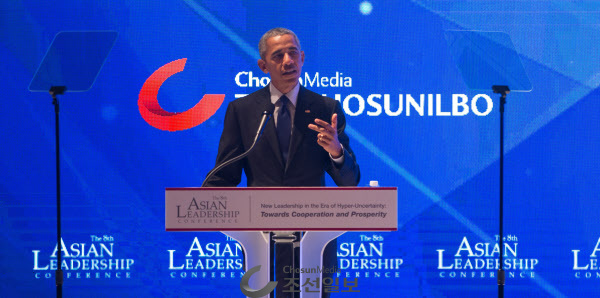
오바마 전 대통령은 “세계는 지금 중대한 변곡점에 있다”고 말했다. 그는 “세계는 과거 어느 때보다도 번영하고 있지만, 경제적 불평등의 심화와 테러·민족주의 양상 등 불확실성이 어느 때보다 높다”고 말했다. “과학기술로 인해 사람들은 과거 어느 때보다 연결돼 있지만, 이로 인해 테러리즘과 독재자들은 어느 때보다 파괴적인 무기를 가지고 있다”는 것이다.
그는 이어 “이런 상황에서는 때로 부족·민족에 기대거나, '우리'와 '그들'을 나누는 정치가 득세할 위험이 있다”며 “지난 두 번의 세계 대전은 이런 변곡점에서 변화에 적응하지 못할 경우 나타날 수 있는 끔찍한 결과물이었다”고 말했다.
오바마 전 대통령은 “하지만 이럴 때일수록 우리에게는 두려움을 극복하고, 분열을 넘는 새로운 사고와 행동의 방식을 가질 것이 요구된다”고 말했다.
이어 “지난 10년간, 세계의 평균 수명이 늘고 극빈층 인구는 절반으로 줄었으며 여성 참정권을 얻어냈고, 원하는 누구와도 결혼할 자유를 얻었다”며 “이런 놀라운 성과로부터 자신감을 갖고, 공포 대신 희망을 바탕으로 세계 변화에 대응해야 한다”고 말했다.
오바마 전 대통령은 세계가 직면한 문제들을 해결하기 위해 “국제적인 질서를 중시할 것”을 강조했다. 특히 북한을 향해 “안보와 번영은 신(新) 무기를 추구하는 것이 아니라 규칙과 규범을 강화하는 데서 온다”고 충고했다.
오바마 전 대통령은 이어 “신기술을 기반으로 한 경제가 소수가 아닌, 모든 사람을 위해 작동하도록 해야 한다”고 했다. 그는 “소수가 부를 독점하는 경제 체제는 오랫동안 작동할 수 없다”고 말했다.
오바마 전 대통령은 “민주주의는 때론 이루기 어렵고 그 성과가 쉽게 부서지기도 한다”며 “하지만 자유주의적인 국제 질서가 힘에 의한 질서보다 우선이라는 것을 믿는다”고 말했다.
이어 “한국과 미국이 함께한다면 극복하지 못할 문제가 없다”면서 “우리가 공통의 가치와 이상을 함께 지켜나간다면 우리 다음 세대의 리더들도 자랑스러운 유산을 이어갈 것으로 믿는다”고 말했다.
다음은 오바마 전 대통령의 연설 전문.
Good morning. Joh-eun achim [joe-nah-CHEEM.] Thank you all for having me, and congratulations to the Chosun Daily Newspaper for recently publishing its 30,000th edition.
It’s so good to be back here in Seoul. I visited here four times as President of the United States – that’s as many times as I visited any other city outside of the United States. That’s a testament to the strength of the alliance between the United States and the Republic of Korea, and the friendship between our people. It’s also a sign of how much I like kimchi.
I’m pleased to be back here during my first trip to Asia as a former President. And though my visit is brief, I look forward to catching up with my old friend, President Lee, and sitting down with your new leader, President Moon.
I’m also glad we’re joined here today by my good friend and long-time aide, Mark Lippert. Mark was a terrific Ambassador here in Seoul, and I know he and his family loved getting to know the Korean people. Thank you, Mark, for your service to our country and to this alliance.
I look forward to sitting down Dr. Hahm Chaibong and taking some questions. But first, let me offer a few observations on the world today.
It’s been clear for a while that the world is at an inflection point. From a city like this, we see clearly the value of the rules-based international order that the United States has been invested in building since the end of World War II, and since our soldiers fought together to protect freedom here on the Korean peninsula.
There is, perhaps, no greater testament to the power of free markets, democratic governance, and interconnection with the wider world than the stark differences on display on the Korean peninsula. Here in Seoul, we see the enormous prosperity, opportunity, and vibrant culture that comes with an open society, while in North Korea, we see the tragic poverty, repression, and suffering that comes with a closed society, and hostility to the wider world.
Make no mistake: this progress was hard-earned. It depended upon the strength of alliances, and the ironclad commitment of the United States of America to stand by the people of the Republic of Korea year after year, decade after decade. And today, I want to pay tribute to the American servicemen and women who remain stationed here in South Korea – I had no higher honor in my life than serving as their Commander-in-Chief.
Of course, this progress also depended on the ingenuity, creativity, and commitment to democratic progress embraced by the Korean people year after year, decade after decade. Through your commitment to innovation; your work ethic; your ties of trade and commerce with the nations of the world, including your trade agreement with the United States, you’ve created a better future for generation after generation.
You’ve also become an exporter of popular culture to the rest of the world. Some of our young people in America have even learned to speak some Korean so they can keep up with the band “SHINee” [pronounced “shiny”]. In exchange, I understand SHINee has developed a passion for America’s In-N-Out Burgers.
So we have much to be proud of. But that doesn’t mean we can rest easy. For we can see that the same international order that we have invested so much in has become increasingly strained by the accelerating forces of change – globalization, technology, and here on the Korean peninsula, the proliferation of nuclear weapons – these shifts have shaken the foundations of individual families and our collective politics, in developed and developing countries alike.
The world is more prosperous than ever before, but alongside these changes, we’ve also seen a rise in inequality and wage stagnation across many advanced economies, leaving too many workers and communities fearful of diminishing prospects for their children. The world is by most measures less violent than ever before; but it remains riven by old divisions and new conflicts. The world is more connected than ever before, but even as technology spreads knowledge and the possibility of greater understanding between peoples, it also empowers terrorists and tyrants who acquire the most destructive weapons of war.
What’s more, in an age of instant information, where TV and Twitter can feed us steady streams of bad news, it can seem like there’s too much uncertainty; that maybe, the center cannot hold. It leaves people searching for some sense of control. It leads to new calls for isolationism or nationalism; to roll back the rights of others, or retreat into the comfortable view that says what’s good for me is good enough, everyone else is on their own.
Those can be understandable, even tempting reactions to changing times. But it’s important to remember, I think, that the world went through a similar moment in the shift from the agricultural era to the industrial age. Then, too, there was a temptation to respond to great uncertainty by falling back into the comfort of tribes, and nationalist thought, and xenophobia, and a politics of “us” versus “them.” And the first and second world wars showed us all too terribly what happens when we fail to adapt to such change.
We know that there’s a better way – to overcome our fears, to reach across our divides, to think anew and act anew – and emerge stronger than before.
Just look at the ways the U.S. and the Republic of Korea have worked together. We’re bound by the service of those who fought together to protect the freedom of South Korea. We’re linked by the alliance we built to guard that freedom. We benefit from the vast web of commerce that carries goods from one side of the Pacific to the other. Our history together; our efforts together – at their best, they speak to a common set of values. Values of pluralism and tolerance. Openness and the rule of law. A liberal, market-based order that placed primacy on our individual rights – our freedoms of speech, press, religion, and assembly – along with a commitment to the dignity and human rights of all people. And we must fight to promote these values every day.
Just in my lifetime, this international order did more than prevent a third world war – it also helped grow the global average life expectancy by about two decades, and cut extreme poverty in half. It helped make it possible for women to vote in every democracy, and the freedom to marry who you love to become a reality in a growing number of nations. That’s why I often tell young people that if you had to choose one moment in history into which you could be born, but you didn’t know ahead of time who you were going to be – what nationality, what gender, what race, whether you’d be rich or poor – you’d choose right now.
But while the extraordinary progress we’ve made over the decades should give us confidence, it should not feed complacency. We have to summon the same capacity to adapt to new circumstances; to meet changing times while upholding timeless ideals; to replace fear with hope.
At this defining moment, that is the spirit we need. Consider what we’ve done together over the past decade. We wrestled the global economy from the brink of depression, and put the world on the path to recovery. We helped stop Ebola in West Africa, saving countless lives. We rallied the world around new sustainable development, including our goal to end extreme poverty. In Paris, we came together around the most ambitious agreement in history to fight climate change – an agreement that, even with the temporary absence of American leadership, will still give our children a fighting chance.
Here in the Asia Pacific, my Administration pursued a rebalance of our foreign policy to focus on this region that holds so much potential to promote peace and prosperity in the 21st century. We strengthened our alliances, and expanded our military cooperation across the region. We increased the bonds of trade, commerce, and people-to-people ties. We deepened our ties with the nations of Southeast Asia, like Indonesia, where my family and I just visited – nations that are brimming with potential. We extended a hand to Myanmar as it began a democratic transition. And we worked to strengthen the rules-based order that has allowed this region to grow, and thrive, and avoid the wars of the past.
Still, we must acknowledge the very real problems that exist in our world today – the forces that sometimes make our people feel like they are powerless in the face of change; the unresolved conflicts, like the one that continues to cast a shadow over this peninsula.
I’ll just offer a few thoughts on how to do that.
First, we have to insist that the future belongs to those who build, not those who are committed to destroy.
North Korea’s pursuit of a nuclear weapon has done nothing to secure the North Korean people. Instead, they live in a prison of fear – cut off from the rest of the world, and denied the most basic human rights. Together, the nations of the world must continue to send a clear message that security and prosperity will not come from the pursuit of new weapons. The international order depends upon the enforcement of clear rules and norms. So long as North Korea chooses to remain outside of that order, they must face the consequences.
Sometimes it is easy to think that this is only a problem for South Korea, or Japan, or for the United States. But the entire world has a stake in what happens – because it must be clear that the path of peaceful cooperation is the only one that can lead to true security and prosperity.
Second, we have to make sure that a high-tech economy works for everybody, and not just a few. Capitalism and open markets have raised standards of living around the globe. But globalization and the relentless pace of automation have weakened the position of workers and their ability to secure decent wages.
We know that economies don’t work as well or grow as fast when a few prosper at the expense of a growing middle class. We also have to recognize that economies that are increasingly unequal pose a threat to our liberal international order. When the top one percent amasses a bigger share of wealth and income, it leaves everybody else feeling as if the game is fixed against them; that their governments only serve the interests of the powerful. It’s a recipe for more cynicism and polarization, and less trust in our institutions and each other.
We can’t unwind integration, pull up the drawbridge, or stuff technology back in a box. Instead, we must invest in our people – their skills, their education, their capacity to take an idea and turn it into a business – and modernize the social safety nets that empower them to take those risks. We must build new social compacts – to give workers the power to organize for better wages, and reform our tax codes so that those who reap the most from the new economy can’t avoid their obligations to the countries that made their success possible. And just as we work to alleviate inequality within our economies, I believe we still need to do more to close the gap between rich and poor nations. Making sure fragile states don’t collapse in the first place, and helping emerging economies become markets for our goods is not just the right thing to do, but the smart thing to do.
Third, we have to recognize that the only way to resolve disputes is through the rule of law – otherwise we will all live with the insecurity that comes with the law of the jungle. Across the Asia Pacific, there are territorial disputes that risk the peaceful co-existence that has enabled so much progress. Without the rule of law, these tensions could lead to settlements based on the principle that might makes right – that is the path that has led to escalation and conflict in the past. That is why my Administration underscored basic international principles – like freedom of navigation, upon which commerce depends; while also supporting the peaceful resolution of disputes, consistent with international law.
I have said many times that the world should welcome the rise of a strong, peaceful and prosperous China. And I also believe that China – and the world – will be better off if a strong China becomes an increasing stakeholder in the international order that supported its rise. Because ultimately, as the history of the United States shows, it is not only small nations that benefit from the enforcement of international law – it’s the large and powerful ones as well.
Finally, we have to recognize how technology has changed the way in which people receive information. We’re more technologically connected than we’ve ever been, but that also makes it easier to retreat into our own bubbles, surrounded by people who think like us, who never challenge our assumptions. This makes us so secure in our beliefs that we accept only information, whether true or not, that fits our opinions, rather than base our opinions on readily-available facts, evidence, and reason. So we need to find new ways to push back on propaganda, cultivate independent journalism, listen to those with whom we disagree, and ultimately bridge our differences to find common ground.
For if our citizens’ expectations are not met; if they believe they have no control over the decisions that are made by distant bureaucrats or a dysfunctional government; they’ll turn from democracy to populist, nationalist, even authoritarian movements.
Democracy is hard. Progress does not move in a straight line. Its gains are often fragile. But the future does not favor the strongman. I believe deeply that the liberal international order; order based not just on military power or national affiliations, but on principles – the rule of law, human rights, individual freedoms – is the only choice. It is what has brought us this far. It is what has promoted economic opportunity, prevented another world war, and lifted millions out of poverty around the globe.
So those of us who believe in democracy need to speak out forcefully. Because both the facts and history, I believe, are on our side. That doesn’t mean democracies are without flaws. It does mean that the cure for what ails our democracies is greater engagement by our citizens – not less. And that’s what I’ll focus on for the rest of my career – active citizenship.
The Obama Foundation will be based in Chicago, but it will have projects, programs, and digital networks all over the world. Many of these will be in partnership with local organizations currently doing great work in their communities. Our international programming will focus on creating space for a wide range of diverse participants to come together to solve local problems – and for training the next generation of citizens and leaders. And I look forward to working with counterparts in the Republic of Korea on this generational project.
Because I believe that the future is on our side, as well. There’s not a challenge on the planet that our two nations don’t take on together. And I have great faith that if we stand up for our values and ideals, then the next generation of leaders – in both our nations and around the world – will carry on that proud legacy.
Thank you all very much.
출처 : http://news.chosun.com/site/data/html_dir/2017/07/03/2017070301113.html
"세계 정치·경제가 리뉴하는 시기… ALC 타이밍 기가 막히다"
출처 : http://news.chosun.com/site/data/html_dir/2017/07/03/2017070300164.html
입력 : 2017.07.03 03:11
[아시안리더십콘퍼런스 오늘 개막 / 초불확실성 시대의 뉴 리더십]
- ALC 참석 인사들 속속 입국
에스코 아호 前 핀란드 총리 "韓美엔 새정부… 세계정치도 급변"
커틀러 전 美무역대표부 부대표 "美, 세계무역 중심역할 하지않아"
마흐무드 말레이시아투자청장 "젊은 재능이 4차 산업혁명 핵심"
"트럼프 정부의 보호무역주의가 더 심해질지는 지켜봐야 한다. 하지만 분명한 건 미국이 더 이상 세계 무역의 중심 역할을 하지 않는다는 것이다."(웬디 커틀러 아시아소사이어티 정책연구소 부소장)
3~4일 열리는 조선일보 주최 '제8회 아시안리더십콘퍼런스(ALC)'에 참석하기 위해 한국을 찾은 글로벌 리더와 해외 연사들이 1~2일 속속 입국했다. 유례없는 초(超)불확실성 시대를 헤쳐나갈 혜안을 전할 리더들은 입국장에서부터 행사에 대한 큰 기대감을 나타냈다.
 이미지 크게보기
이미지 크게보기
일본에 머물다 2일 입국한 웬디 커틀러 아시아소사이어티 정책연구소(ASPI) 부소장은 한·미 FTA(자유무역협정) 협상 당시 미국 무역대표부 부대표로 미국 측 협상을 담당했었다. 그는 "오바마 정부에서 일했는데, 서울에서 그를 다시 만난다니 감회가 새롭다"며 "당시 FTA 협상 상대였던 김종훈 전 통상교섭본부장을 다시 만나는 것도 설렌다"고 말했다. 웬디 부소장과 김종훈 전 본부장은 3일 오후 '보호무역 시대의 생존 전략' 세션에서 연사로 만난다.
1일 입국한 시브샨카르 메논(Menon) 전 인도 국가안보보좌관은 "이번이 세 번째 방한인데, 정부 공무원으로 공항과 청와대만 왔다 갔다 해 한국을 제대로 볼 기회가 없었는데 이번엔 그럴 수 있을 것 같다"며 들뜬 모습이었다. 그는 사드(고고도 미사일 방어체계) 관련 한·중 갈등에 대해 "중국은 외교·군사적 자유에 영향을 주는 모든 것에 대해 분명한 목소리를 내고 주도권을 갖겠다는 신호를 보내고 있다"며 "이런 상황에서 한국과 인도는 정치·경제·안보적으로 협력할 필요성이 있다"고 말했다.
아즈만 마흐무드(Mahmud) 말레이시아투자진흥청장은 2일 "4차 산업혁명 시대 경제적 불확실성에 대응하기 위해 가장 중요한 것은 인적 자본을 구축하는 새로운 리더십"이라며 "젊은이들과 그들의 재능이 4차 산업혁명의 핵심 자원"이라고 강조했다.
전 세계 벤처 기업들을 발굴 육성하는 자비에 두포르테 헬로투모로 회장은 아내와 함께 가벼운 차림으로 2일 입국했다. 그는 "아시안리더십콘퍼런스는 과학이 세상을 어떻게 바꿀 수 있는지 전 세계 리더들과 이야기 나눌 수 있는 좋은 기회라고 생각한다"며 "한국의 창의적 과학자들을 발굴해 세계로 나가도록 돕고 싶다"고 말했다.
'창업 이스라엘 설계자'로 불리는 이갈 에를리히 요즈마그룹 회장은 2일 한국에 도착해 "아시안리더십콘퍼런스는 혁신에 대해 얘기를 나눌 수 있는 매우 중요한 행사라 기대가 많이 된다"고 밝혔다. 그는 3일 오후 '이스라엘 혁신 대가들을 만나다' 세션에서 이스라엘 혁신을 이끈 '후츠파 정신'과 '한국 스타트업들의 혁신 가능성' 등에 대한 이야기를 들려줄 예정이다. 그는 "한국 스타트업들이 좀 더 세계시장을 염두에 두고 활동할 필요가 있다"고 지적했다.
아시안리더십콘퍼런스 첫날 기조연설을 하는 버락 오바마 전 미국 대통령과 함께 아내 미셸 오바마와 두 딸 말리아(19)·사샤(16)도 방한한다. 이번이 첫 한국 방문인 미셸 오바마와 말리아·사샤는 콘퍼런스에는 참석하지 않고 별도 일정을 보낼 것으로 알려졌다.
4일 기조연설자인 데이비드 캐머런 전 영국 총리는 3일 한국에 들어올 예정이다. 당초 첫날 오찬 연설을 할 예정이었던 후쿠다 야스오(福田康夫) 전 일본 총리는 급박한 개인 사정 때문에 참석하지 못하게 됐다.
출처 : http://news.chosun.com/site/data/html_dir/2017/07/03/2017070300164.html
'중국' 카테고리의 다른 글
| 17초만에 궤도 이탈한 中 '우주 굴기' (0) | 2017.07.04 |
|---|---|
| '4000년에 한 번 나온다는' 중국 아이돌 미모 근황 (0) | 2017.07.04 |
| 유커 끊기자 임대료도 못벌어…한화, 제주공항면세점 손 뗀다 (0) | 2017.07.03 |
| [WEEKLY BIZ] 도이체방크 삼킨 中 천펑 회장 '세계 금융 제국' 야심 (0) | 2017.06.17 |
| 왕서방이 한국부동산에 쏠린 이유는 ‘삶의 질·싼값·안전’…투자처, 제주에서 서울로 북상 (0) | 2017.06.17 |
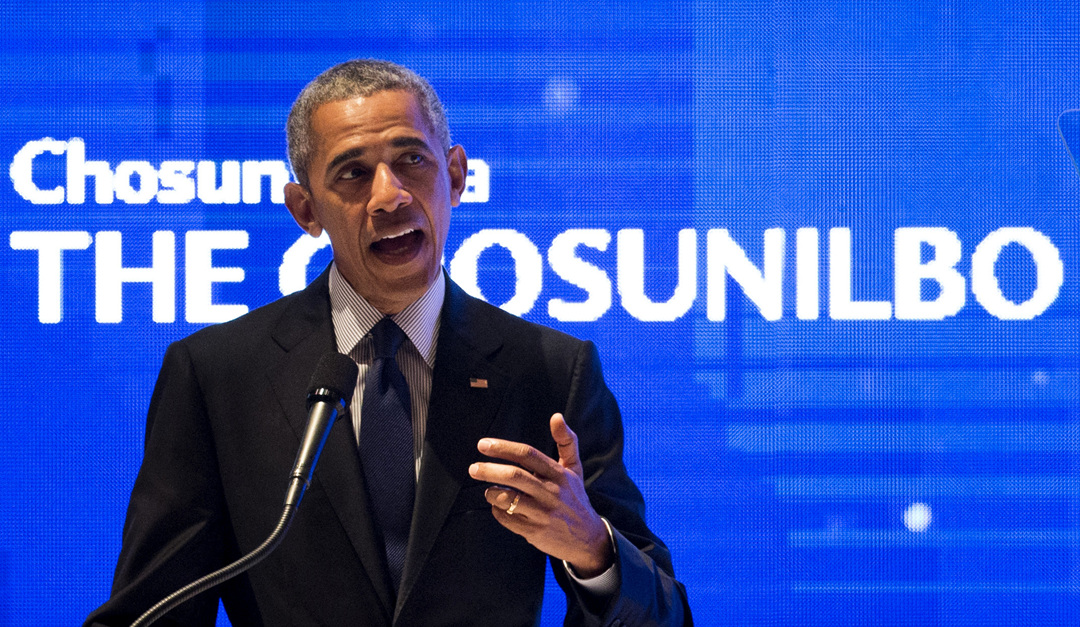 3일 오전 서울 광진구 워커힐호텔에서 열린 아시아 리더십 콘퍼런스. 오바마 전 미국 대통령이 기조연설을 하고 있다. /김지호 기자
3일 오전 서울 광진구 워커힐호텔에서 열린 아시아 리더십 콘퍼런스. 오바마 전 미국 대통령이 기조연설을 하고 있다. /김지호 기자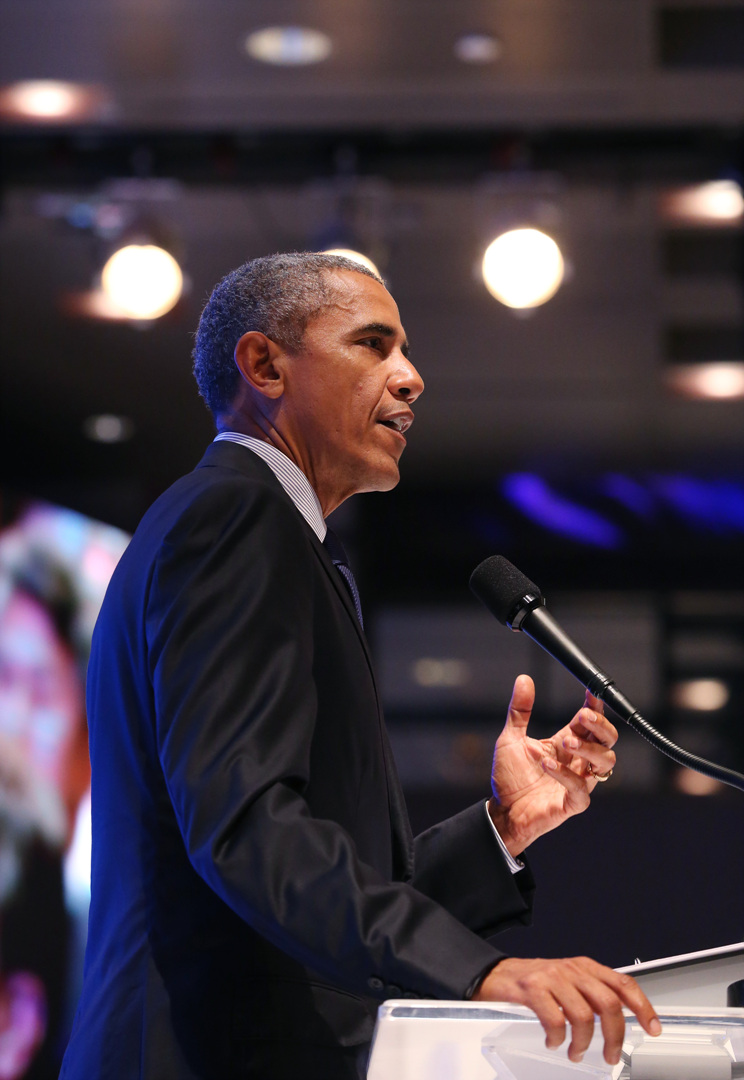 3일 오전 서울 워커힐 호텔 비스타룸에서 열린 제8회 아시안리더십콘퍼런스 '리더와의 대화'에서 버락 오바마 전 미국 대통령이 기조연설을 하고 있다. / 오종찬 기자
3일 오전 서울 워커힐 호텔 비스타룸에서 열린 제8회 아시안리더십콘퍼런스 '리더와의 대화'에서 버락 오바마 전 미국 대통령이 기조연설을 하고 있다. / 오종찬 기자 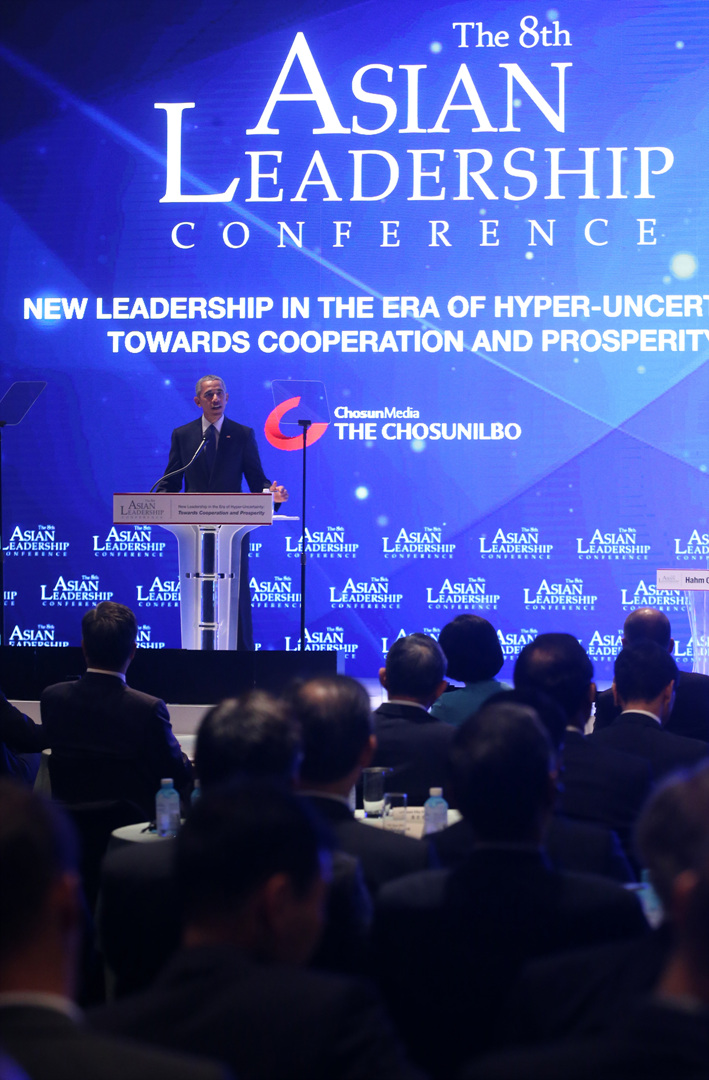 3일 오전 서울 워커힐 호텔 비스타룸에서 열린 제8회 아시안리더십콘퍼런스 '리더와의 대화'에서 버락 오바마 전 미국 대통령이 기조연설을 하고 있다. / 오종찬 기자
3일 오전 서울 워커힐 호텔 비스타룸에서 열린 제8회 아시안리더십콘퍼런스 '리더와의 대화'에서 버락 오바마 전 미국 대통령이 기조연설을 하고 있다. / 오종찬 기자 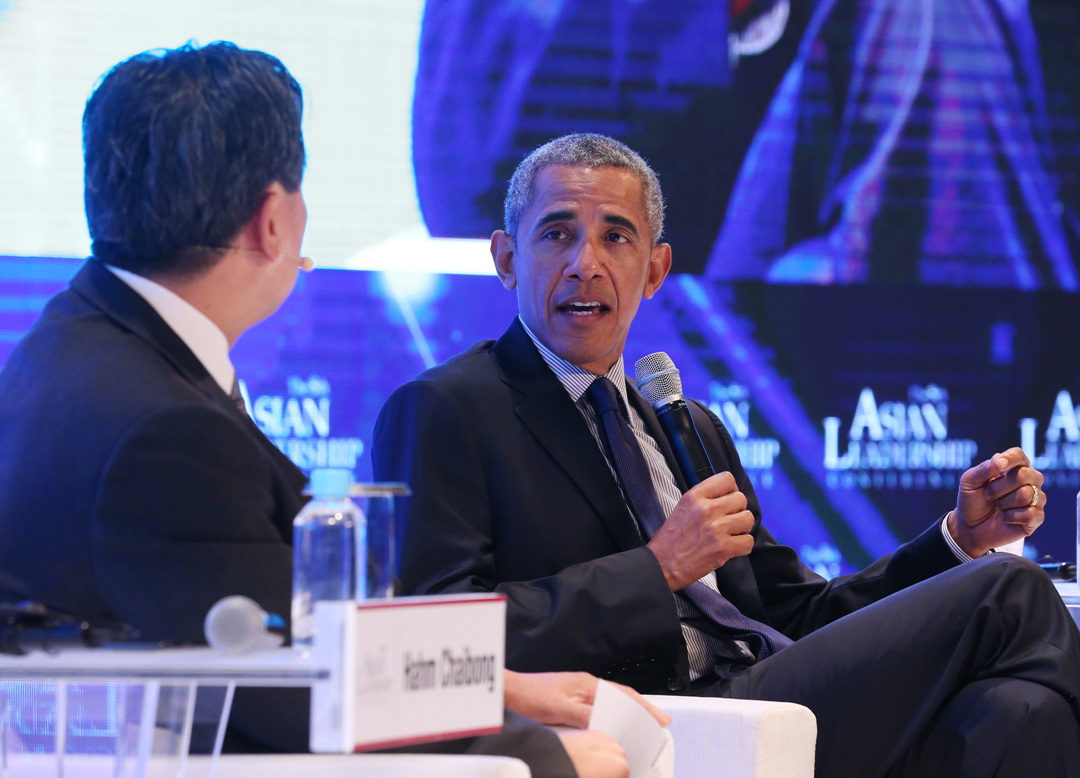 3일 오전 서울 워커힐 호텔 비스타룸에서 열린 제8회 아시안리더십콘퍼런스 '리더와의 대화'에서 버락 오바마 전 미국 대통령과 함재원 아산정책연구원장이 대담을 하고 있다. / 오종찬 기자
3일 오전 서울 워커힐 호텔 비스타룸에서 열린 제8회 아시안리더십콘퍼런스 '리더와의 대화'에서 버락 오바마 전 미국 대통령과 함재원 아산정책연구원장이 대담을 하고 있다. / 오종찬 기자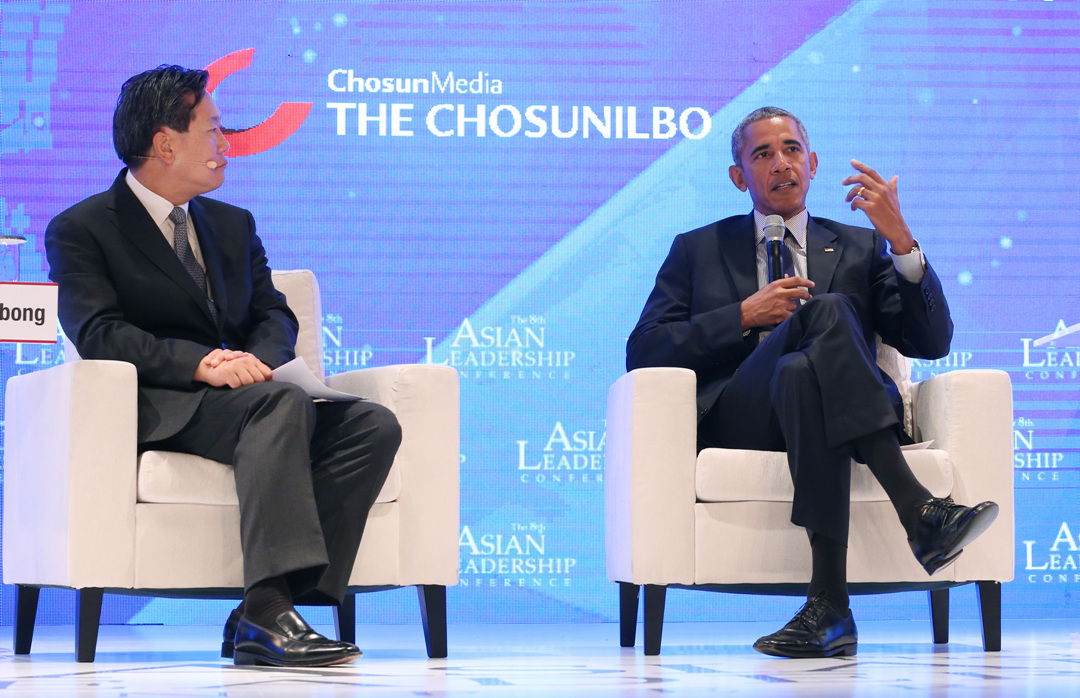 3일 오전 서울 워커힐 호텔 비스타룸에서 열린 제8회 아시안리더십콘퍼런스 '리더와의 대화'에서 버락 오바마 전 미국 대통령과 함재원 아산정책연구원장이 대담을 하고 있다. / 오종찬 기자
3일 오전 서울 워커힐 호텔 비스타룸에서 열린 제8회 아시안리더십콘퍼런스 '리더와의 대화'에서 버락 오바마 전 미국 대통령과 함재원 아산정책연구원장이 대담을 하고 있다. / 오종찬 기자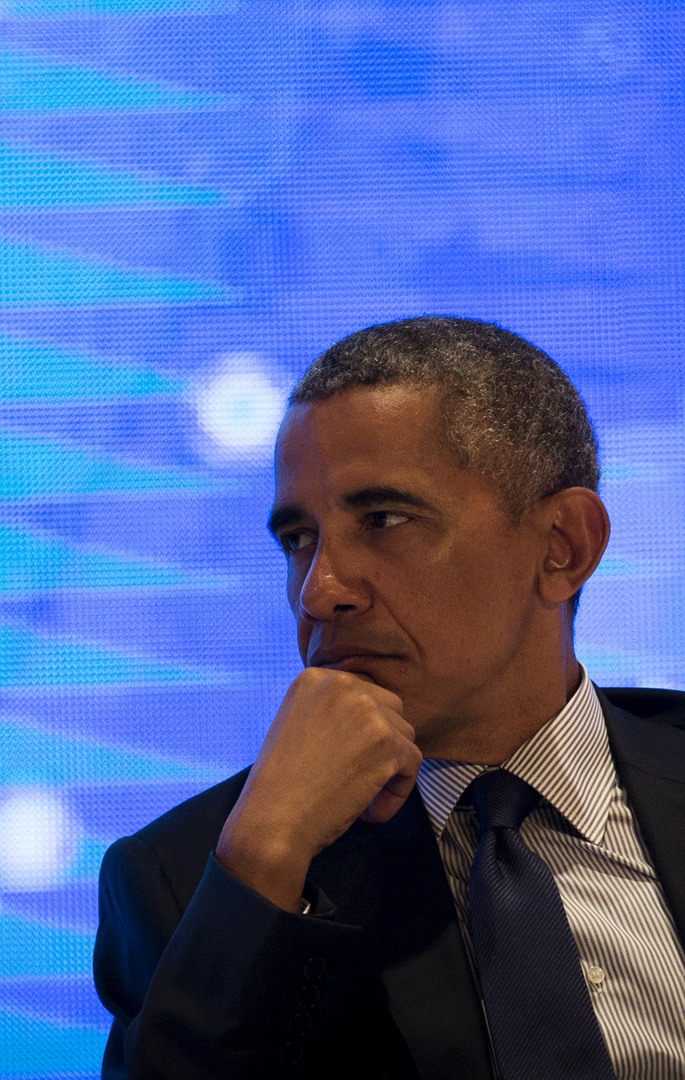 3일 오전 서울 광진구 워커힐호텔에서 열린 아시아 리더십 콘퍼런스. 오바마 전 미국 대통령이 '리더와의 대화'를 주제로 연설하고 있다. /김지호 기자
3일 오전 서울 광진구 워커힐호텔에서 열린 아시아 리더십 콘퍼런스. 오바마 전 미국 대통령이 '리더와의 대화'를 주제로 연설하고 있다. /김지호 기자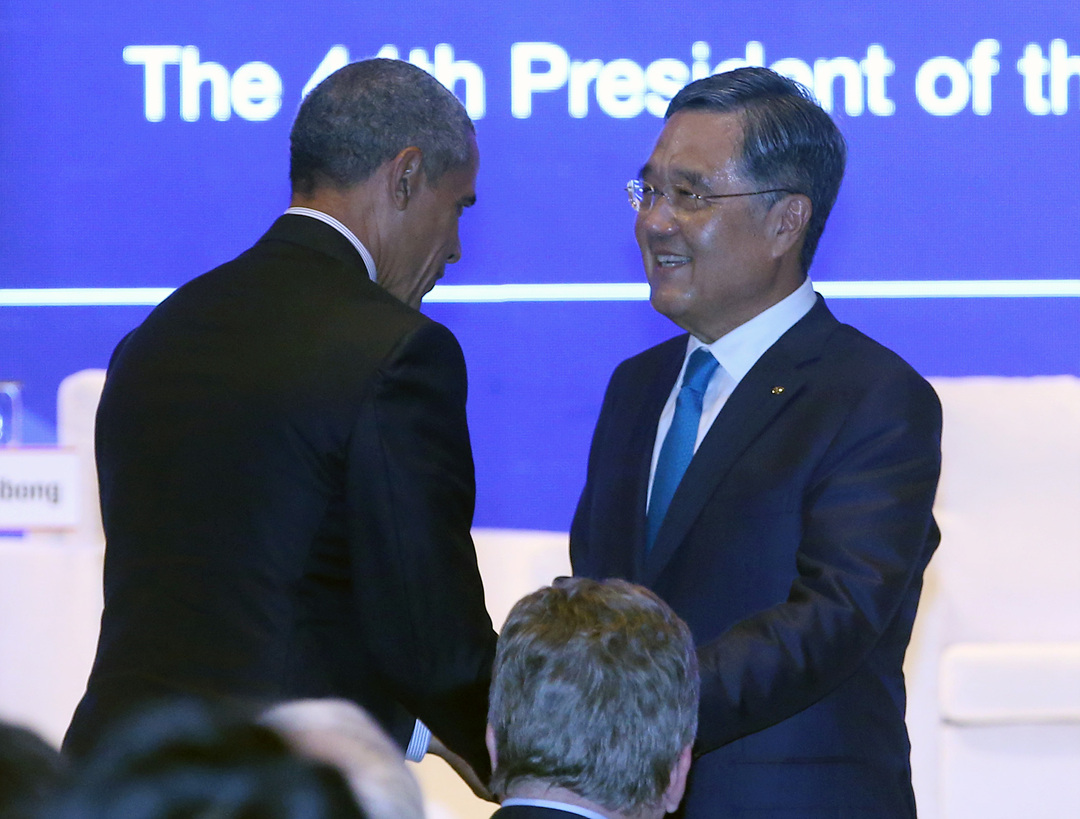 3일 오전 서울 광진구 워커힐호텔에서 열린 아시아 리더십 콘퍼런스. 오바마 전 미국 대통령이 기조연설을 마치고 조선일보 방상훈 사장과 악수를 하고 있다. /김지호 기자
3일 오전 서울 광진구 워커힐호텔에서 열린 아시아 리더십 콘퍼런스. 오바마 전 미국 대통령이 기조연설을 마치고 조선일보 방상훈 사장과 악수를 하고 있다. /김지호 기자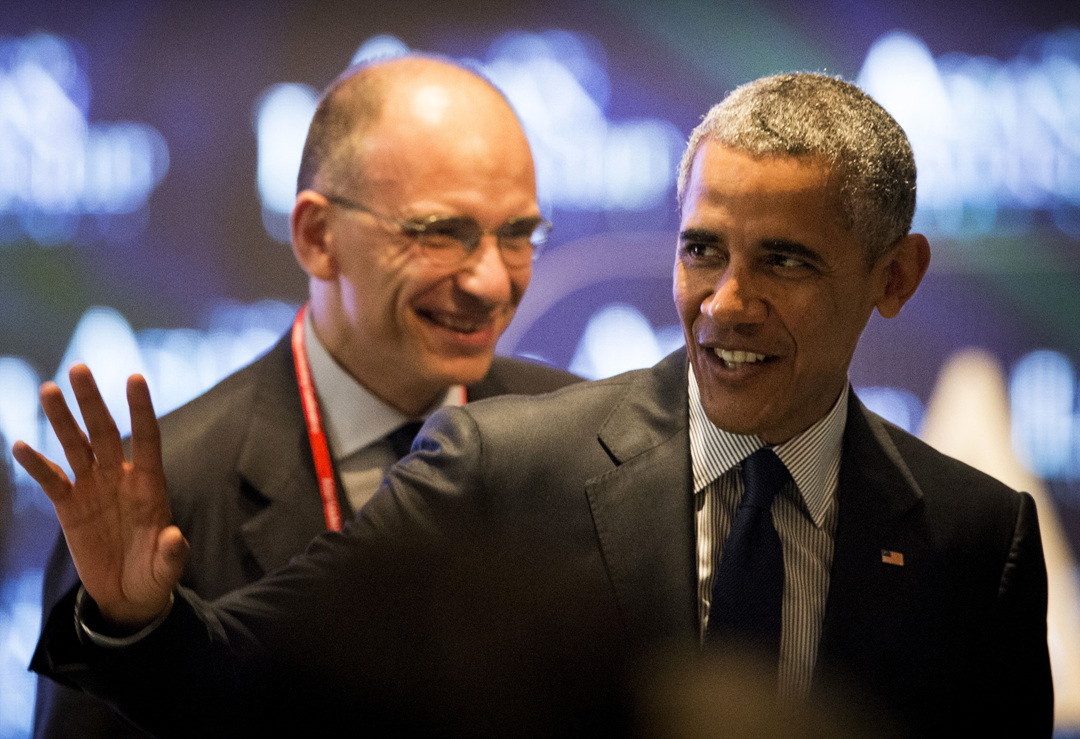 3일 오전 서울 광진구 워커힐호텔에서 열린 아시아 리더십 콘퍼런스. 오바마 전 미국 대통령이 '리더와의 대화'를 주제로 연설을 마치고 회의장을 나서고 있다. /김지호 기자
3일 오전 서울 광진구 워커힐호텔에서 열린 아시아 리더십 콘퍼런스. 오바마 전 미국 대통령이 '리더와의 대화'를 주제로 연설을 마치고 회의장을 나서고 있다. /김지호 기자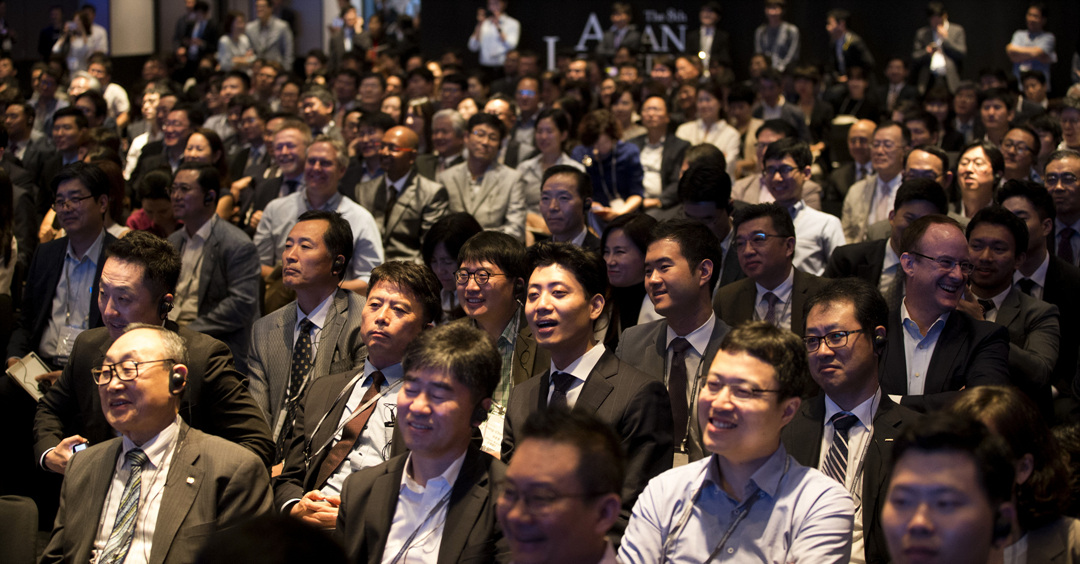 3일 오전 서울 광진구 워커힐호텔에서 열린 아시아 리더십 콘퍼런스. 오바마 전 미국 대통령이 '리더와의 대화'를 주제로 연설을 하고 있는 가운데 참가자들이 밝은 모습을 보이고 있다. /김지호 기자
3일 오전 서울 광진구 워커힐호텔에서 열린 아시아 리더십 콘퍼런스. 오바마 전 미국 대통령이 '리더와의 대화'를 주제로 연설을 하고 있는 가운데 참가자들이 밝은 모습을 보이고 있다. /김지호 기자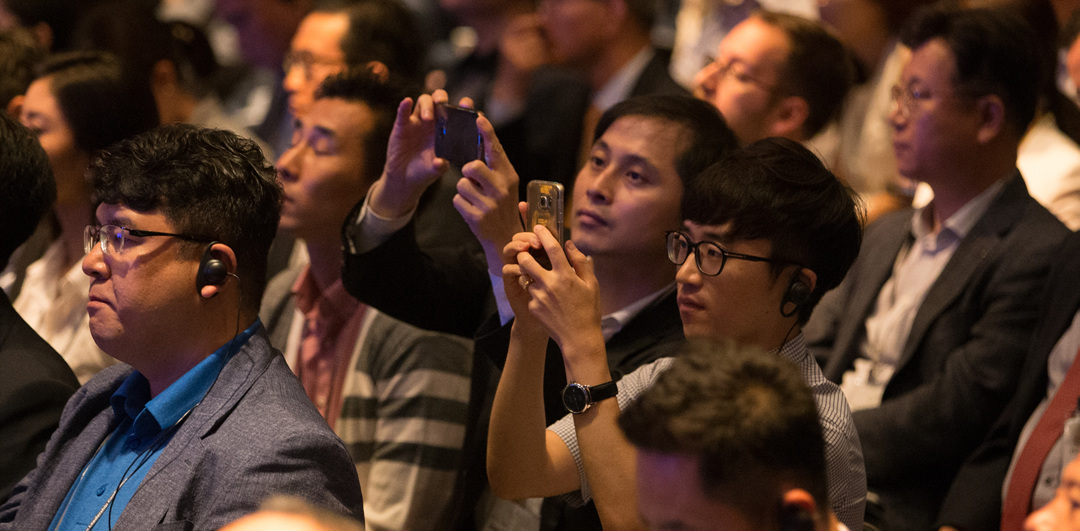 아시아 리더십 콘퍼런스가 열린 2017년 7월 3일 오전, 서울 광진구 워커힐호텔에서 오바마 전 미국 대통령이 연사로 나선 가운데 참가자들이 휴대폰으로 촬영하고 있다. / 고운호 기자
아시아 리더십 콘퍼런스가 열린 2017년 7월 3일 오전, 서울 광진구 워커힐호텔에서 오바마 전 미국 대통령이 연사로 나선 가운데 참가자들이 휴대폰으로 촬영하고 있다. / 고운호 기자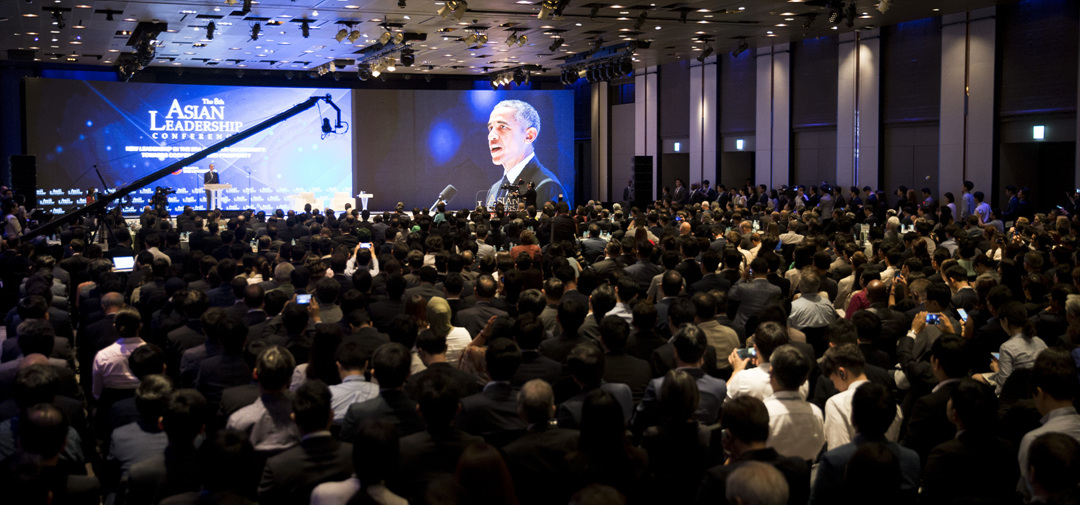 아시아 리더십 콘퍼런스가 열린 2017년 7월 3일 오전, 서울 광진구 워커힐호텔에서 오바마 전 미국 대통령이 '리더와의 대화'를 주제로 연설하고있다. / 고운호 기자
아시아 리더십 콘퍼런스가 열린 2017년 7월 3일 오전, 서울 광진구 워커힐호텔에서 오바마 전 미국 대통령이 '리더와의 대화'를 주제로 연설하고있다. / 고운호 기자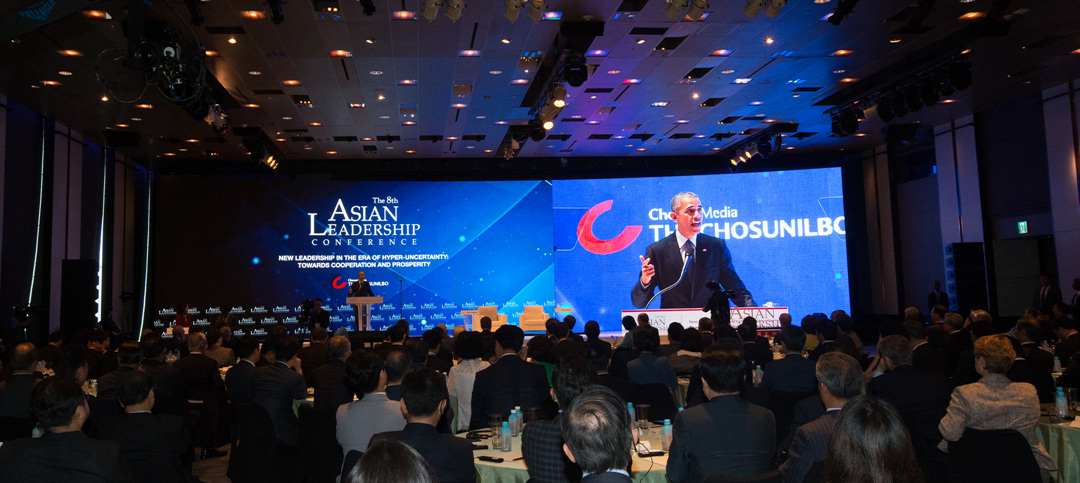 3일 오전 서울 광진구 워커힐호텔에서 열린 아시아 리더십 콘퍼런스. 오바마 전 미국 대통령이 '리더와의 대화'를 주제로 연설하고 있다. /김지호 기자
3일 오전 서울 광진구 워커힐호텔에서 열린 아시아 리더십 콘퍼런스. 오바마 전 미국 대통령이 '리더와의 대화'를 주제로 연설하고 있다. /김지호 기자